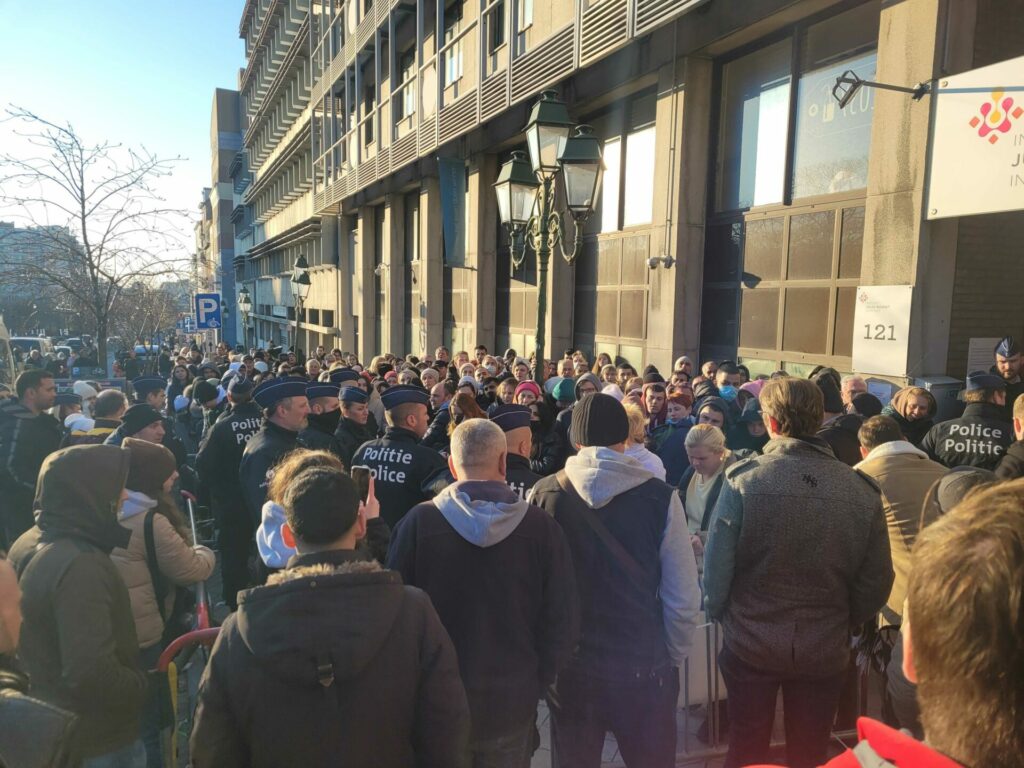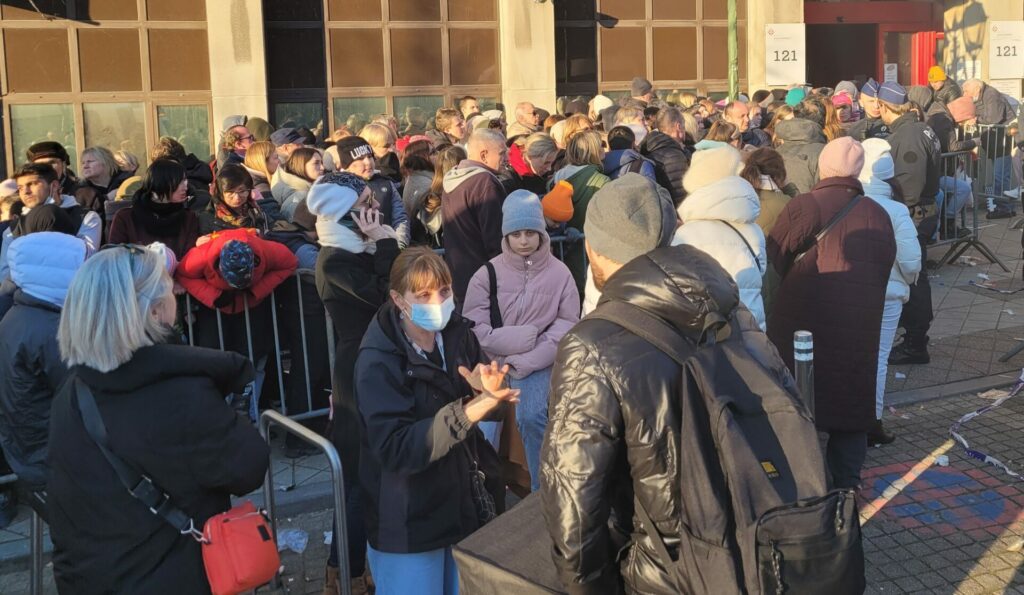Hundreds of Ukrainians waited in line on Monday at a registration centre in the former Jules Bordet hospital on Brussels' Boulevard de Waterloo Avenue, seeking to register their presence and receive government support.
On 24 February, Russia launched an all-out offensive against Ukraine, displacing millions and devastating many of Ukraine’s cities. When Russian forces did not achieve their objectives, they resorted to indiscriminate shelling of civilian areas, killing thousands.
Since the start of Russia’s invasion, more than two million people fled the war in Ukraine, according to the UN's High Commissioner for Refugees, Filippo Grandi.
As previously reported, the EU has activated its temporary protection directive to offer quick and effective assistance to people fleeing the war in Ukraine. Those fleeing the war will be granted temporary protection in the EU, meaning that they will be given a residence permit, and they will have access to education and to the labour market.
Police officers at the centre in Brussels estimated that between 1,000-1,500 Ukrainians queued at the refugee reception centre in the morning. By 15:00, most were still in line.
While queuing, Ukrainians spoke of their plans for the future, the homes they left behind, and their escape from an active warzone.
Back to Belgium
"You hear the sounds of airstrikes, the missiles and bullets over your head. It changes everything completely."
Vlad, a civil engineer from a small city around 100km from Kyiv, is no stranger to Belgium. In English, he says that he left his home on 23 February. "You're probably wondering, why Belgium?" he asks. "I did my master's degree here... I still have some friends here who have welcomed me and gave me some place to stay."
When the war broke out, Vlad rushed to the border at 08:00. There, 4 hours after the start of the war, he managed to cross into Poland. "I had to find a car to take me, I found a driver but he refused to take my luggage. So I just got in the car with my backpack, my laptop, papers, and the clothes which I had on me and went with him."
Now, Vlad hopes to evacuate his family too. While he got out early, his family remained in their small city as the town became a target for bombardments. "My mum left two days after me and she’s in Brussels." His father, aged 72, had been reluctant to leave, but Vlad hopes he will join him soon.
Vlad had been in the queue since 07:00. He stated that he had only seen 15 people go into the refugee reception centre in the last few hours. With support from friends and some money from his bank account, Vlad is calm. He states that he just wants to officialise his presence here, even if that can't be achieved today.
Nowhere to go
Others find themselves in a more desperate situation. Karina fled Kyiv with her mother. The train took nearly 40 hours, passing via Germany to reach Belgium. Many of Karina’s friends are fighting in the territorial defence or seeking refuge in bomb shelters and metro stations.
She and her family had no place to sleep for the night, relying on the sympathy of others. Determined, she assured me that they would find somewhere. "Ukrainians here and foreigners all help when they hear that you are from Ukraine," she says. "Everyone immediately rushes to help."
She, like most in the queue, has no connection to Belgium but seemed excited at the prospect of living in Brussels. "It’s great here, it’s always been a dream."
Fedasil overwhelmed
Karina and her family waited for help in the queue but were forced to abandon their plans after waiting for more than 3 hours. "The plan is to wait for at least something, so that we understand what to do in the future."
Indeed, long queues have prevented many people from accessing support services offered by the government. A Ukrainian-born Brussels resident, who had come to the refugee reception point to help her compatriots, stated that there had been chaos in the morning.
According to the woman, who wished to remain anonymous, Fedasil, the Federal Agency responsible for refugees, had initially attempted to call the names of those waiting one by one. This eventually failed after the crowd became restless and rushed through the doors. Police later arrived and ordered the crowd into a proper queue.
Belgium has mapped out a specific route for the registration and reception of Ukrainian citizens, using the site of the former Jules Bordet as an initial reception point. However, one recently arrived Ukrainian family reported not receiving assistance for housing despite making it to the front of the queue.
Related News
- Molenbeek reception centre welcomes Ukrainian refugees
- Court condemns Belgium for asylum crisis, situation remains precarious
- ‘Like a nightmare, but worse’: two Ukrainian women on the run to Poland
According to Fedasil, if registered Ukrainians cannot find a solution for accommodation in Belgium (with friends or family), Fedasil will ensure that they are directed towards accommodation proposed by the municipalities. Yet even registering has proven difficult for most arrivals, some waiting up to seven hours to officially register.
Throughout the day, the queue became shorter as asylum seekers simply gave up, vowing to try again another day. Ukrainians have 90 days visa-free access to the European Union, allowing them to stay for several months without penalty.
Nevertheless, families like Karina’s risk falling through the cracks. The Belgian Government has been repeatedly criticised for failing to do enough to accommodate refugees.
In January, several human rights organisations addressed an open letter to Belgian Prime Minister Alexander De Croo, condemning the lack of shelter provided to asylum seekers in Brussels.
Ukrainians queuing to register stated that they were mostly relying on the support of the Ukrainian community in Brussels, using Facebook groups to get help and find places to stay.
Waiting to go home
Not all are keen to claim refugee status. Vladimir, from Kyiv, surveyed the crowd from the pavement. He has three children and a wife who fled with him to Lublin, Poland.
He decided to travel ahead of his family to Belgium, where he studies his masters remotely, to see if it would be a good place to bring his family. What he saw, however, put him off.
"I just arrived and came to look, I was shocked by how big the queue was… I don’t want to stay here. I listened to President Zelensky yesterday when he said that he will soon say when we can return home. I’m waiting for the green light and we’ll go," he said.
He stated that he had no interest in refugee status, he had just travelled to see what the process would be like. When asked how he escaped Ukraine, the emotion was visible as Vladimir told his story.

The crowd swelled as the processing centre admitted only a trickle of refugees. Credit: Dylan Carter
It took him four hours just to leave Kyiv, driving through the forest and watching fighter jets swoop over them. They encountered Russian troops and had no internet or phone signal and sat for almost two days at the border with Poland.
“My son couldn’t sleep at night…I felt a voice inside me telling me that I should get ready to leave, but I didn’t want to go anywhere, I wouldn’t go. Then, at 04:00, there was a big explosion, so strong it made the windows shake," the Kyiv resident said.
He had pleaded with his brother to leave also, but he had dismissed his appeals. Since then, he hasn’t heard back from him. "I called my brother in Odessa," Vladimir said.
"I said, brother, there's war. 'What kind of war? I’m sleeping, what are you talking about, I don’t believe you,' he said. I said to my brother, 'Then I love you' and that’s all. Those were my last words to him."
For information on how to access assistance from Fedasil, see here.

